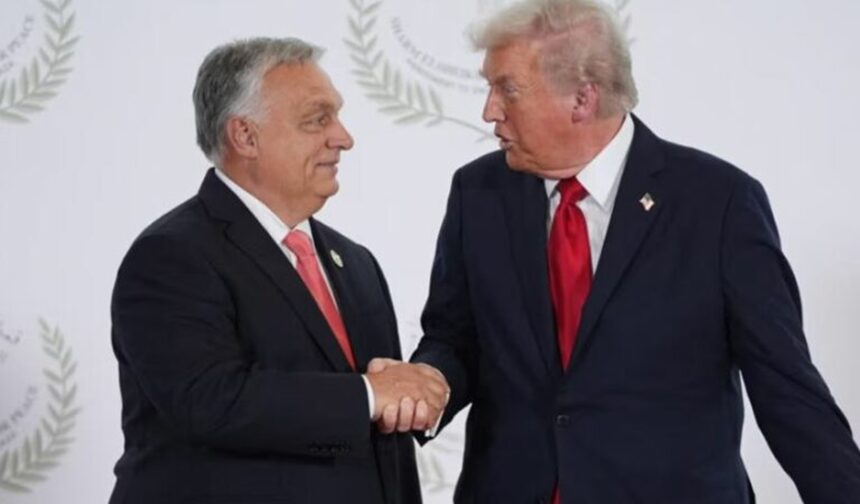A warm reception is expected as U.S. President Donald Trump welcomes Hungarian Prime Minister Viktor Orban to the White House on November 7. Beyond their personal rapport, the two leaders have a long agenda of issues to discuss during their luncheon meeting.
Although Orban and Trump share ideological similarities and often echo each other’s rhetoric, they remain on opposing sides regarding policy on Russian oil imports. Meanwhile, plans for Orban to host a summit in Budapest with Trump and Russian President Vladimir Putin have been put on hold.
A U.S. exemption from measures aimed at limiting trade in Russian oil appears to be a key item on Orban’s Washington wishlist.
The Hungarian Service of Radio Free Europe reported that discussions with sources within the Hungarian government suggested that they believe an exemption from the sanctions is likely. A precedent exists in Europe, following last month’s decision to temporarily exempt Rosneft’s German branch from sanctions.
Neither the White House nor the U.S. State Department responded to questions from Radio Free Europe.
“He requested an exemption. We didn’t grant it… Viktor is my friend. He requested an exemption,” Trump told reporters on October 31 aboard Air Force One.
Sanctions on Russian Oil
Last month, Washington announced sanctions on Russia’s two largest oil companies: the state-controlled Rosneft and privately owned LUKoil. The sanctions were intended to pressure Putin to enter negotiations to end the invasion of Ukraine, which began more than three years ago. The move also exposes secondary sanctions on those doing business with these companies.
Earlier, Trump threatened secondary tariffs on states importing Russian crude. In September, he called on “all NATO members” to halt imports, without specifically mentioning Hungary, though a U.S. diplomat referenced Budapest last month.
“Hungary, unlike many of its neighbors, has not made any plans or taken active steps to reduce its reliance on Russian energy supplies,” said U.S. Ambassador to NATO Matt Whitaker in an interview with Fox News published on October 27.
“There’s a lot of planning our friends in Hungary will need to do,” he added, promising U.S. assistance for those efforts.
Orban has not hidden his displeasure with the issue.
When recently asked whether U.S. sanctions had gone too far, he said, “from a Hungarian perspective, yes.” He also stated that halting oil purchases would be a “catastrophe” that would “bring the economy of our country to its knees.”
On November 5, Hungarian Foreign Minister Peter Szijjarto did not mention the matter, perhaps to temper expectations of an agreement in Washington.
“We Don’t Have Much to Offer Each Other”
In his November 5 statement, Szijjarto described bilateral relations as enjoying a “golden era,” noting that discussions would focus on economic and energy cooperation, without providing details. Hungary is not a major U.S. trading partner: according to U.S. trade registration data, the U.S. had a $9.4 billion deficit with Hungary in 2024, with exports to Hungary totaling only $3.2 billion.
A source in the Hungarian government told Radio Free Europe that “we don’t have much to offer each other,” but added that Orban could agree to purchase U.S. liquefied natural gas, despite previously considering it economically less favorable compared to Russian gas imports.
This, along with minor arms purchases and cooperation with U.S. companies in the civilian nuclear energy sector, could form part of a “quid pro quo” deal, potentially including an exemption from oil sanctions.
Orban’s delegation, numbering around 180 people and traveling on a chartered plane provided by Hungarian airline Wizz Air, will include government ministers, business leaders, and others.
Szijjarto’s statement also listed “peace in Ukraine” as a key topic for discussion and reiterated Budapest’s offer to host the summit. However, hopes for a Trump-Putin meeting in Budapest are currently low.
Orban’s stance on Ukraine has remained largely unchanged since Russia’s full-scale invasion of the neighboring country in February 2022: he opposes military support for Kyiv and has attempted to block sanctions on Russia.
This once aligned him with Trump, though the U.S. president has increasingly expressed frustration with Putin’s unwillingness to compromise in peace negotiations.
On October 22, Trump stated, “Whenever I talk to Vladimir [Putin], we have good discussions, and then they lead nowhere.” These statements were followed by new oil sanctions, which Putin called “unfriendly.”
Orban’s opposition to Ukraine joining the European Union may or may not be a discussion point. In August, Bloomberg reported that Trump called Orban, urging him to stop blocking Kyiv’s EU accession talks.
Szijjarto, however, denied this: “I want to make it clear that no such call took place. It did not happen. Period,” he said.
Prior to Orban’s visit, the issue resurfaced. When asked on November 4 whether Trump had expressed support for Ukraine’s EU membership, Ukrainian President Volodymyr Zelensky said, “Donald Trump supports Ukraine as a future EU member.”
Through a translator, he added: “We discussed blocking of certain points by the Hungarian leader. I asked President Trump if he would support us in this matter to help us. He said he would do everything he could.”
On the same day, Orban responded on social media:
“Hungary does not support and will not support Ukraine’s EU membership because it would bring war to Europe and send Hungarian money to Ukraine,” he wrote.
In a separate development ahead of the Trump-Orban meeting, Kari Lake, acting CEO of the U.S. Agency for Global Media (USAGM), informed the U.S. Congress on November 5 of the decision to halt and cease funding the Hungarian Service of Radio Free Europe, citing that it “does not align with U.S. national interests.”
The service had resumed operations in 2020 under a congressional directive.







